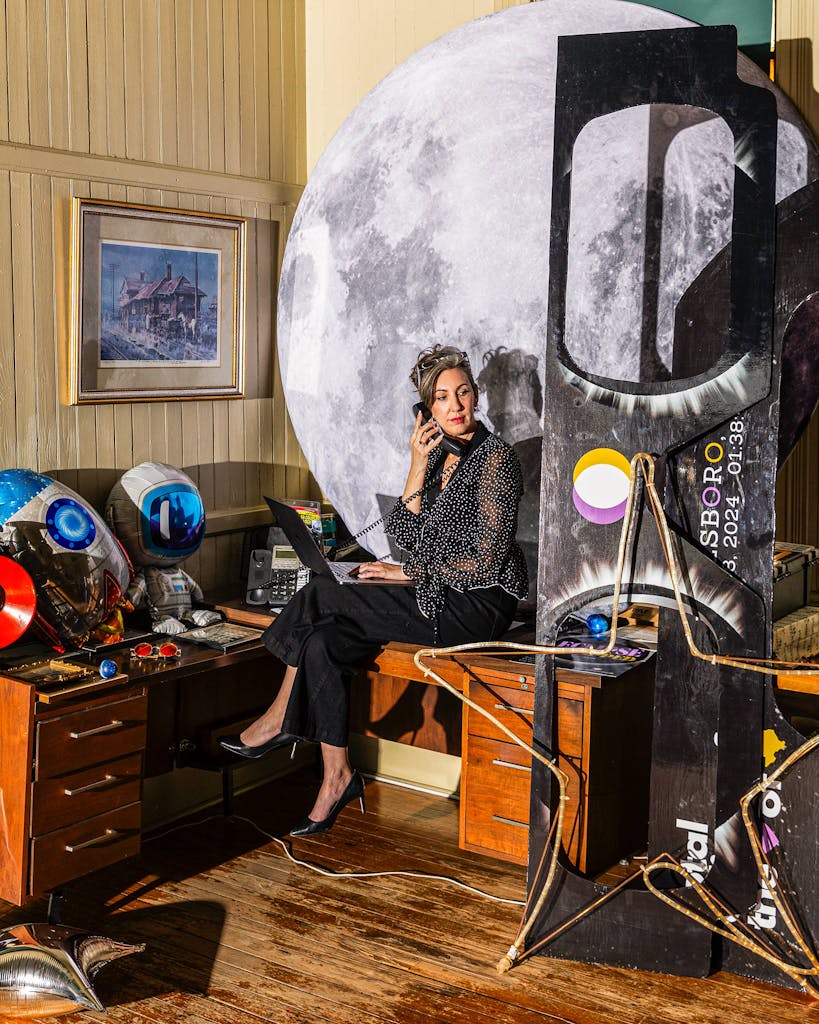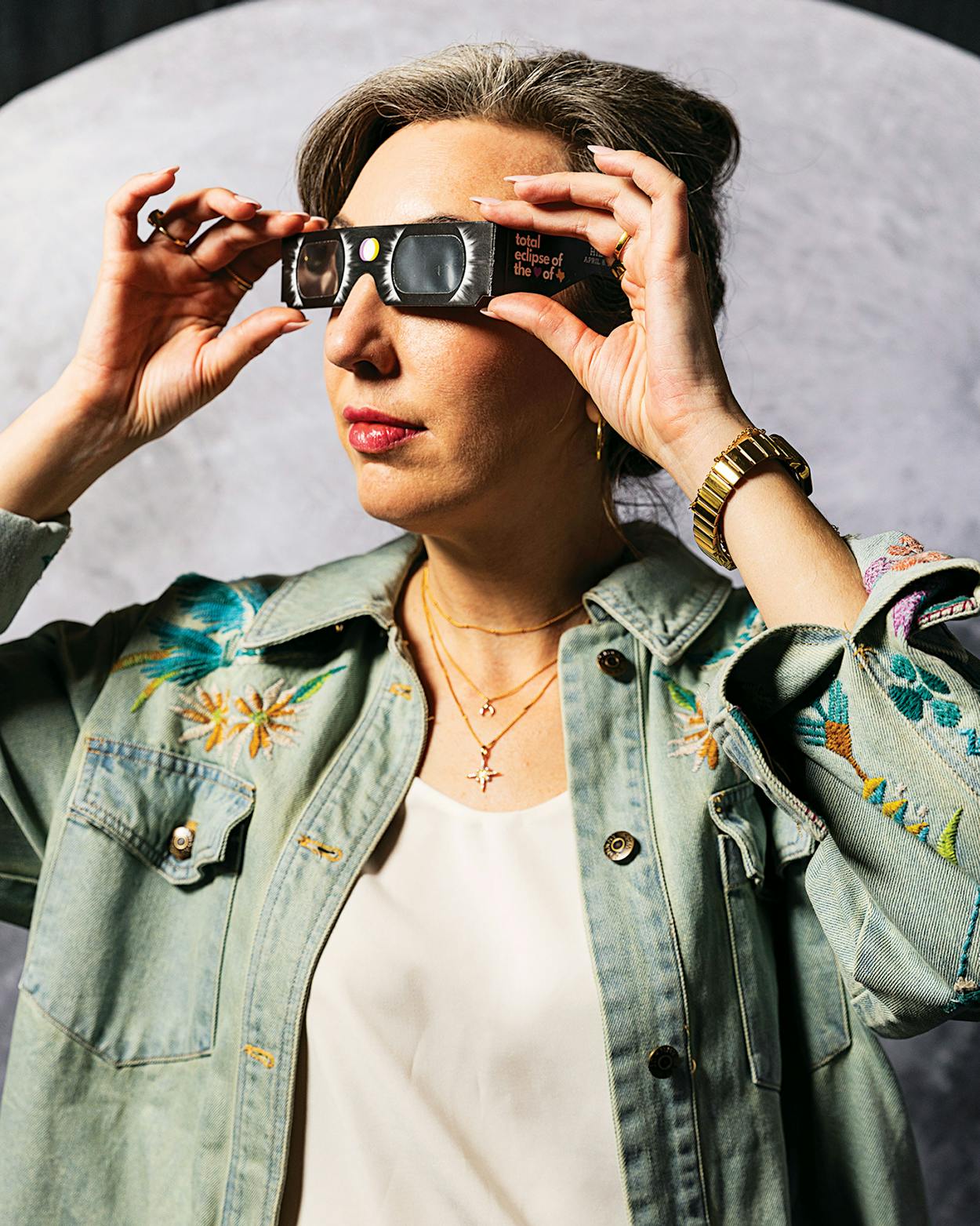Allyson Cliett, who is forty, is the special projects coordinator for Hillsboro. She’s responsible for preparing the North Texas city for the total solar eclipse on Monday, April 8.
I grew up in Hillsboro, an hour south of Dallas, and moved back about a decade ago. In February 2023 I applied for a position with the city. Our city manager invited me to coffee and asked if I had heard about the solar eclipse. She explained that she needed a special projects coordinator whose first assignment would be getting Hillsboro ready for a huge influx of tourists coming to see it. I thought that sounded amazing.
The eclipse crosses the country from Texas to Maine, but the path of totality, where the moon completely blocks the sun, is only about 115 miles wide. Hillsboro is close to the centerline, which means we have a longer period of darkness: 4 minutes and 23 seconds. We have fewer than 10,000 residents. The website Great American Eclipse projects that we will receive between 15,000 and 60,000 visitors on April 8. That’s somewhat terrifying.
Hillsboro has nine hotels, and they’ve all been booked since before I was hired. We heard horror stories from the 2017 eclipse about underprepared towns that had no designated campsites. Visitors were going door to door trying to find someone who would let them park an RV in their driveway. We’re offering tent camping in our city park and RV parking at the old outlet mall just off I-35. We also have private landowners who want to monetize this thing and offer camping on their property, which is fine, but I want them to register with the city so our emergency responders know where the crowds are.
I’ve never seen a total eclipse, and I haven’t met anyone in Hillsboro who has. But I’ve studied up. I explain to residents that to protect your eyes you have to keep your safety glasses on throughout the partial eclipse. But once the moon completely blocks the sun you can take them off. For those 4 minutes and 23 seconds, there’s no direct sunlight that can damage your eyes.
The sky gets dark during totality, and that’s the only time you can see the corona, the outer atmosphere of the sun, which comes out from behind the moon in these beautiful silvery tendrils. During totality, birds and animals act strange, crickets come out, cows go to the barn. Temperatures can drop. It gets dark and quiet and weird.
The porta-potty situation is a big deal. Soon after I was hired, I reserved one hundred. In December I got nervous and doubled that. When I first contacted the rental company, they told me they didn’t think there’d be any strain on supply, because they could pull in inventory from across the country. When I called back to double the order, they said, “You’re right in the nick of time—we’re running out.” Everyone in the path of totality is competing for the same resources.

We’re expecting a lot of private planes to land at our municipal airport on April 8. We will probably see more planes than we’ve ever landed in a day. Outside of crop-dusting season, our airport sees six to ten daily landings. For rural airports like ours, you don’t have to make a reservation to land. We don’t have a control tower. Our airport manager and I were very nervous about this, but the Civil Air Patrol has agreed to manage the airport for the eclipse.
We’ve had a town hall meeting almost every month. I’ve been telling residents to plan ahead: make sure you have your medications. Don’t plan your doctor’s visit on April 8. Hillsboro has really come together around this eclipse, but folks are always worried about traffic and parking. We’re working on it.
Some locals are nervous about the influx of tourists. I tell them that research shows that eclipse tourists are nature lovers, foodies, and science nerds. They clean up after themselves. They’re not spring break partiers. Some folks who live out in the country are ready to chase trespassers off their property.
I hear a lot of, “Why is the city investing all this time and money into 4 minutes and 23 seconds?” I remind them that 75 percent of the roughly $200,000 the city has spent is related to health, safety, and logistics. And the
beautification projects will enhance our town long after the eclipse.
Our public works department is building three giant pairs of plywood eclipse safety glasses—eight feet by two feet—for photo ops. The lenses will be two layers of plexiglass with solar film in between them, so they’ll be functional too. We’re going to borrow a bunch of rocking chairs from residents who have extra and put them around downtown. Some ladies who are very serious about beautification have formed a group called Operation Welcome Mat and are putting out picnic tables and string lights and getting the Lions Club to put flags out like they do on Labor Day and the Fourth of July.
Eclipse chasers prefer small towns because we have darker skies, so I have a light-pollution task force that’s asking businesses to turn off their neon signs during totality. There are several streetlamps in our Main Street district that the electric company can’t turn off, so we’re figuring out how to prevent them from coming on. We want the sensors on those lamps not to realize that it’s getting dark. We tried shooting a laser pointer directly at one of the sensors, and that worked, but someone would have to stand at each streetlamp and aim a laser directly at it for almost five minutes. We’re going to come
up with a less labor-intensive way to prevent the lights from coming on without tampering with them.
I have 55,000 pairs of eclipse safety glasses. I’ve also been thinking about how to help the differently abled experience the eclipse. I’m giving the leftover solar film from the giant eclipse glasses to a nursing home so they can put it over a window and roll residents in wheelchairs over to watch. I also got two LightSound devices, which translate the changing light intensity into sound for the visually impaired.
The worst-case scenario is that it’s raining everywhere nearby in the path of totality but not in Hillsboro. That would mean the tourists in Waco and Dallas might come here, and we’d have quadruple the visitors. The very worst case might be if it rains in Hillsboro. But I don’t allow myself to think about it. As we get closer to the eclipse, I will have every prayer group in town praying for a sunny day.
I’m going to be one of those people who weeps in the streets during the eclipse—both because it’s a beautiful natural phenomenon and because it will represent the culmination of so many months’ work. That’ll probably be one of the most intense moments of my life.
This article originally appeared in the April 2024 issue of Texas Monthly with the headline “Allyson Cliett, Eclipse Coordinator.” Subscribe today.
- More About:
- Working Life
- Hillsboro







